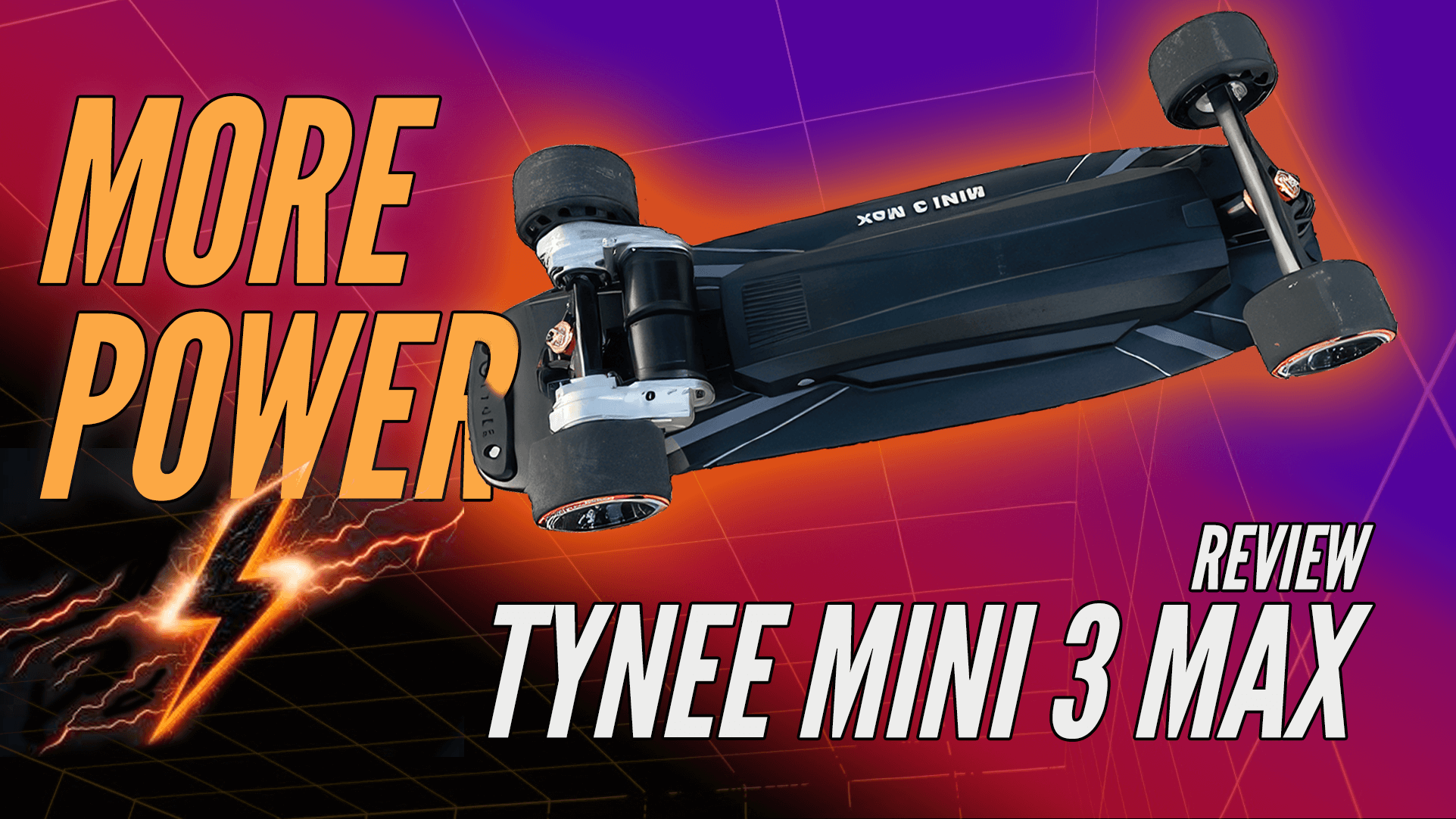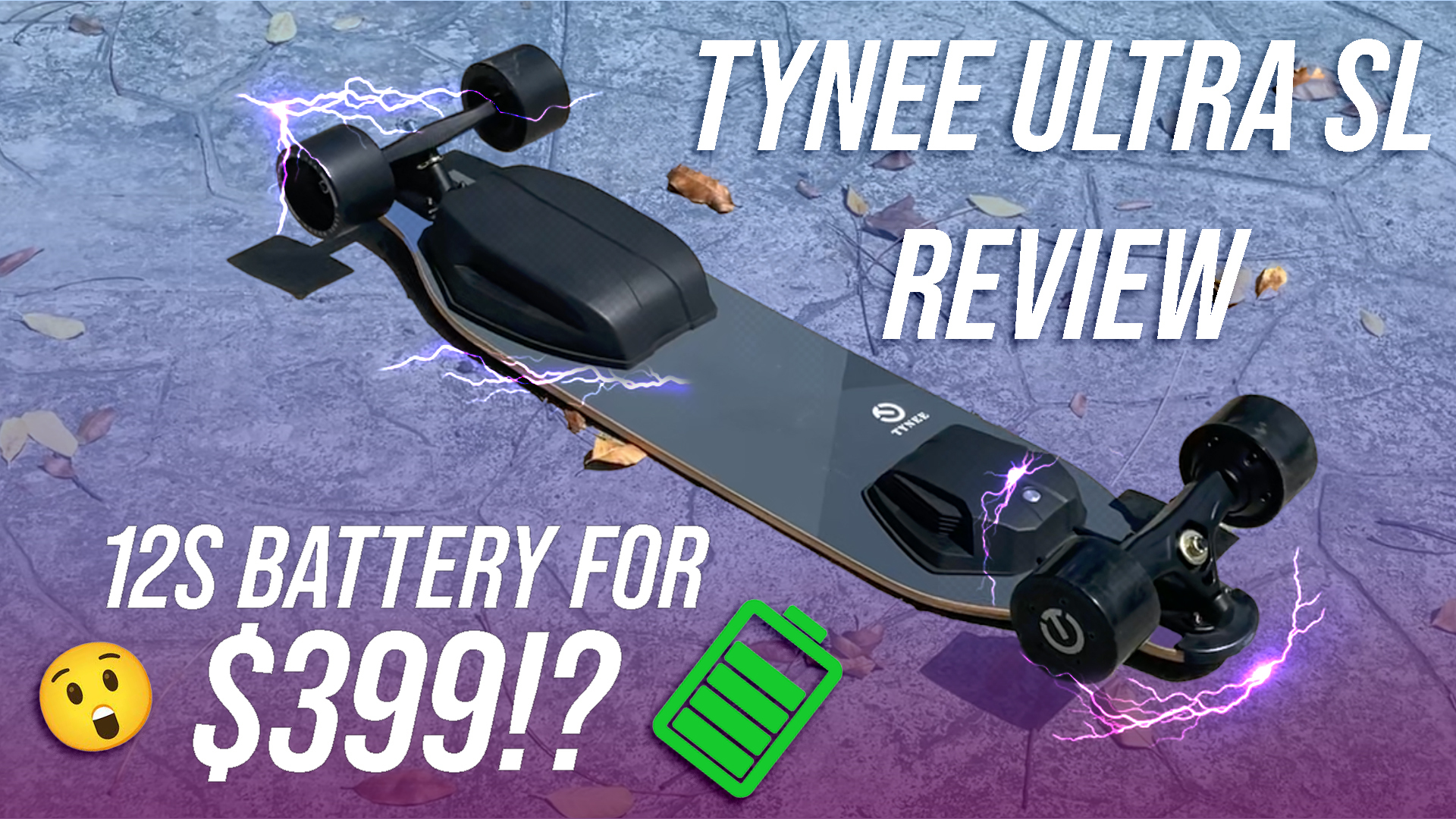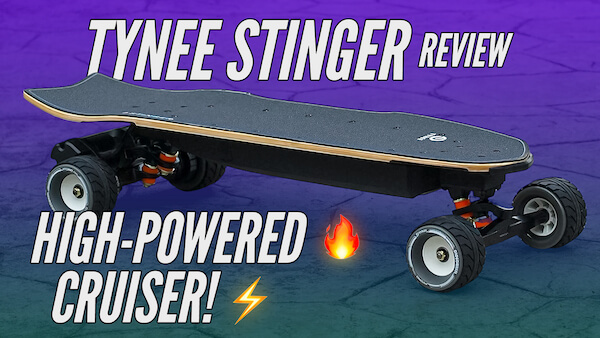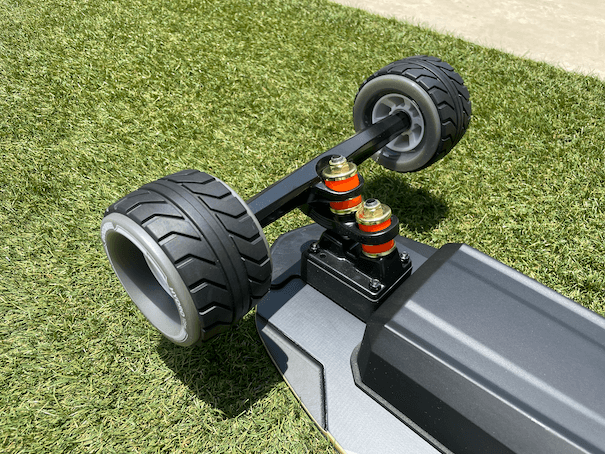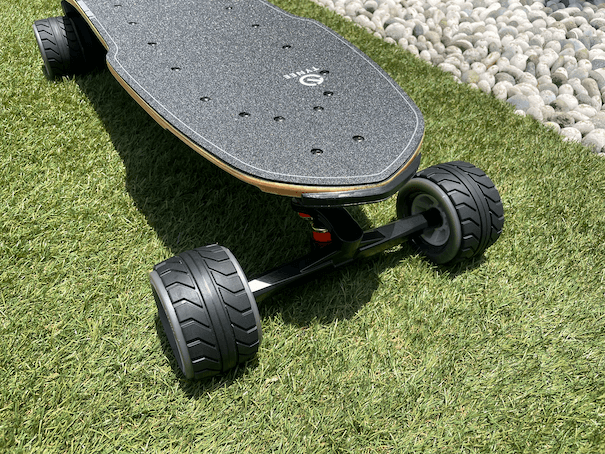Not many brands dare to make high-end hub-driven all-terrain electric skateboards, as people came to expect anything more than $1000 to come with a belt or gear drive system. In fact, the Backfire Ranger X5 was the only worthwhile mention in this category until Tynee decided to make this $1,299 Tynee Explorer Pro.
The Tynee Explorer Pro did come with both belt and hub version, but we will be reviewing the hub version today.
As usual, let’s run through the specs
Tynee Explorer Pro Hub Specs:


| Price | $1,299 |
| Battery | 14S4P 1008Wh Samsung 50S battery |
| Controller | 14S Hobbywing ESC |
| Top Speed | 31 mph (50 km/h) |
| Range | 50 miles (80 km) |
| Deck | Multi-layer composite of Canadian maple, bamboo, and fiberglass |
| Motor | Dual 2500W Hobbywing hub motors |
Deck – Multi-layer composite of Canadian maple, bamboo, and fiberglass:


Starting with the deck, it measures 38” long and 10” wide. What makes the Tynee Explorer Pro Hub unique is that it uses a multi-layer composite deck made from Canadian maple, bamboo, and fiberglass, which makes for one of the most flexible decks on an all-terrain setup, with a flex level akin to the Backfire Ranger X5.
This is also a drop-down deck, as is almost always the case with AT boards, to keep the ride lower and more stable. Tynee also added 3mm padded shock-absorbing grip tape to cut down on vibrations. The deck has some good concave, which is nice. We hate flat decks here.
ESC and Battery – 14S Hobbywing ESC and 14S4P 1008Wh Samsung 50S battery:


Following the deck build, the electronic enclosure is also just as flexible which allows the deck to flex naturally with it. Inside, there’s a 14S4P battery and a 14S Hobbywing ESC. The Hobbywing ESC isn’t a surprise—every Tynee board comes with one—but opting for a 14S configuration instead of 12S is an interesting choice. At the very least, it shows an intention to provide as much voltage as possible to drive torque, compensating for the lack of gear reduction in a hub motor system. For context, most setups get by just fine with a 12S configuration.
The Explorer Pro also uses high-quality Samsung 50S cells, adding up to 1008Wh of battery capacity. And for the more energy-efficient hub version, Tynee claims a range of 50 miles (80km) on a single charge, while the belt version, which is less energy-efficient, is marketed to go 37 miles (60 km) on a single charge.
The Explorer Pro also comes with the standard Hobbywing remote. From there, you can tweak some settings, like speed profiles, top speed, etc. Alternatively, you can also use the mobile phone app for advanced customization.
Motors and Wheels – Dual 2,500W Hobbywing hub motors and 7” (165mm) airless all-terrain wheels:


Powering the Tynee Explorer Pro Hub is a pair of 2,500W hub motors. While numbers aren’t everything, the fact that these are the highest-wattage hub motors we’ve seen in the market speaks volumes.
Interestingly, the hub setup comes with smaller 165mm airless wheels, which slightly lowers the top speed in contrast to the belt setup, which uses 175mm pneumatic wheels. The hub version tops out at 31 mph (50 km/h), while the belt version can reach 37 mph (60 km/h).
We’re guessing Tynee chose to trade top speed for better acceleration when opting for smaller wheels on the hub version to boost low-end torque, especially during takeoff. In all honesty, it was the right call because the Tynee Explorer Pro takes off strong.
You really have to brace yourself and press against the deck if you go full throttle from a standstill—otherwise, you’re getting thrown off. Besides good acceleration, the board brakes pretty strongly, too.
We’re pretty impressed that a hub drive can produce that kind of power. Sure, at this price, it’s still a step back compared to powerful belt and gear drives, but for a hub drive? This is impressive.
While belt and gear drive systems are often preferred for their higher torque and aggressive acceleration, hub motors have their own advantages. It’s more power-efficient, which means better range per charge; it requires lower maintenance, since there are no belts to replace or adjust and lastly it’s a quieter operation.
An additional benefit when using hub motors on an all-terrain board is that you don’t have to worry about debris—no sand, sticks, or leaves clogging up the drivetrain. It’s a hassle-free setup that works well for both urban and off-road riding.
Another worry-free option are the 6-inch (165mm) airless rubber tires, which eliminate the need to adjust air pressure or deal with flats. Pneumatic tires may provide a little smoother ride, but they also carry the risk of punctures and pressure loss, which can cause serious problems while riding.
We rode on grass without getting stuck thanks to these tires’ respectable grip.
Trucks – Precision TKP trucks:


As for the trucks, the Explorer Pro uses TKP trucks, which are becoming more and more popular in high-performance builds, instead of the more conventional double kingpin setups.
For those who prefer DKP trucks, Tynee offers a DKP baseplate, allowing riders to swap to a DKP setup if they want. They also offer a lifetime warranty on all their trucks, which is a nice touch.
These TKP trucks perform as expected—more carvy than reverse kingpin trucks but not as extreme as DKP trucks. That also means more stability than DKP, making high-speed riding easier and more reliable.
We can see why Tynee went with TKP trucks here. Since they designed the board for both hub and belt setups, and the belt version can hit 37 mph or 60 km/h, hence prioritizing stability makes sense. Riding the Explorer Pro at 31 mph feels comfortable and controlled, thanks to the extra effort in keeping the board stable.
Tynee Explorer Pro Hub – Specs Summary and Verdict:


To put it short, at $1,299, the Tynee Explorer Pro is a solid value buy.
Take a look at this chart I made for our blog post on the best affordable all-terrain electric skateboards:

You can see that the Tynee Explorer Pro gives you a lot more battery for the price.
I’d assume that hub systems cost less, which frees up more budget for the battery, but then again, the Ranger X5 and the Maxfind FF AT also use hub motors but don’t give you nearly as much juice.
The Tynee Explorer Pro Hub is most obviously comparable to the Backfire Ranger X5. Both have flexible decks, airless wheels, and hub-driven all-terrain boards. Both are excellent for riders who want a comfortable, low-maintenance board that is stress-free. They aren’t ideal for riding on steep mountain routes, but they are decent enough to glide over gravel roads, grass, cracks, and bumps.
The Ranger X5 has more style, thanks to its beautiful lighting, but the Tynee Explorer Pro is notably more powerful. It has stronger torque, a higher top speed, and significantly more range. The Explorer Pro also sits lower to the ground, whereas the Ranger X5 rides a bit higher.
For casual riders who just want a big-wheel board without the hassle, a hub-driven all-terrain board makes a lot of sense. The Tynee Explorer Pro and even the $999 non-Pro version offer exactly what you need—without having to pay a premium tax. This is a board that we can wholeheartedly recommend.
Tynee made its name with powerful premium shortboards, but the Explorer series shows they can do all-terrain longboards just as well. Let’s see if stepping outside of their specialty pays off!
If you are interested in buying the Tynee, be sure to check out our affiliate discount link here and use code: “ESKATEHQ” to receive $5 off during checkout.
It will help you get a small monetary discount and help us out too. On top of that, you’ll be tagged as an Electric Skateboard HQ customer and probably be treated better. Cheers!





